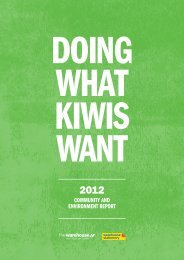ar11-lr-final
Create successful ePaper yourself
Turn your PDF publications into a flip-book with our unique Google optimized e-Paper software.
Notes to and forming part of the Financial Statements – continued<br />
For the 52 WEEK period ended 31 July 2011<br />
18. Cash and Cash Equivalents<br />
GROUP GROUP PARENT PARENT<br />
2011 2010 2011 2010<br />
$000 $000 $000 $000<br />
Cash on hand and at bank 16,916 16,786 2,526 2,530<br />
Deposits at call – interest rate: 2.50% (2010: 3.15%) 6,100 84,440 – –<br />
23,016 101,226 2,526 2,530<br />
Cash on hand and at bank includes EFTPOS (electronic funds transfer point of sale) transactions which have not been cleared by<br />
the bank. The Group’s balance date is always a Sunday which means the three previous day’s store sales, which have been paid by<br />
EFTPOS, remain uncleared at balance date.<br />
19. Inventories<br />
GROUP 2011 2010<br />
$000 $000<br />
Finished goods 243,395 231,143<br />
Inventory adjustments (9,725) (9,453)<br />
Retail stock 233,670 221,690<br />
Goods in transit from overseas 28,993 32,916<br />
262,663 254,606<br />
Inventory adjustments for stock obsolescence are provided at balance date and the movement in the adjustments recognised within<br />
cost of sales in the Income Statement.<br />
Goods in transit from overseas<br />
Goods in transit from overseas are recognised when title to the goods is passed to the Group. Title to the goods is passed when<br />
valid documents (which usually include a ‘bill of lading’) are received, and terms, as set out in a supplier’s letter of credit or in the<br />
supplier’s terms of trade, are met.<br />
The parent has no inventories.<br />
20. Trade and Other Payables<br />
GROUP 2011 2010<br />
$000 $000<br />
Trade creditors 98,053 89,173<br />
Goods in transit creditors 12,130 12,918<br />
Unearned income (includes laybys, gift vouchers and Christmas club deposits) 8,457 7,743<br />
Interest accruals 1,349 1,539<br />
Payroll accruals 8,924 8,683<br />
128,913 120,056<br />
Trade payables are normally unsecured and non-interest bearing and are usually settled within 60 days of recognition. Due to the<br />
short term nature of these payables, their carrying value is assumed to approximate their fair value. With the exception of an accrual<br />
for $0.949 million (2010: $0.949 million) relating to interest payable on the fixed rate senior bond the parent has no other payables.<br />
Notes to and forming part of the Financial Statements – continued<br />
For the 52 WEEK period ended 31 July 2011<br />
21. Trade and Other RECEIVABLES<br />
GROUP 2011 2010<br />
$000 $000<br />
Trade receivables 14,336 11,056<br />
Allowance for impairment (681) (742)<br />
13,655 10,314<br />
Other debtors and prepayments 10,160 6,069<br />
Employee share purchase plan loans 1,976 2,637<br />
25,791 19,020<br />
Less: Non-current employee share purchase plan loans (1,413) (2,091)<br />
Current trade and other receivables 24,378 16,929<br />
Other debtors includes an insurance receivable of $3.302 million (2010: $Nil) for insured losses sustained in the Canterbury<br />
earthquakes (refer note 12).<br />
(a) Trade receivables<br />
Trade receivables arise from sales made to customers on credit or through the collection of rebates from suppliers not otherwise<br />
deducted from suppliers’ payable accounts. Trade receivables are non-interest bearing and are generally on 30 to 60 day terms.<br />
Due to the short term nature of trade and other receivables, their carrying value is assumed to approximate their fair value.<br />
Collateral is not held as security, nor is it the Group’s practice to transfer (on-sell) receivables to special purpose entities.<br />
An ageing analysis of trade receivables at balance date is set out below:<br />
GROUP<br />
0 TO 30<br />
31 TO 60<br />
61 TO 90<br />
> 90<br />
Total<br />
DAYS<br />
DAYS<br />
DAYS<br />
DAYS<br />
$000 $000 $000 $000 $000<br />
As at 31 July 2011<br />
Trade receivables 14,336 10,457 2,278 643 958<br />
Allowance for impairment (681) (11) (7) (95) (568)<br />
13,655 10,446 2,271 548 390<br />
As at 1 August 2010<br />
Trade receivables 11,056 8,198 1,680 613 565<br />
Allowance for impairment (742) (32) (70) (152) (488)<br />
10,314 8,166 1,610 461 77<br />
Trade receivables greater than 60 days are considered to be past their due date. Collectability of trade receivables is reviewed on an<br />
ongoing basis at an operating unit level. Individual debts that are known to be uncollectable are written off when they are identified.<br />
An impairment provision is recognised when there is objective evidence that the Group will not be able to collect the receivable.<br />
Financial difficulties of the debtor or debts more than 60 days overdue are considered objective evidence of possible impairment.<br />
The amount of the provision represents the difference between the asset’s carrying amount and the estimated recoverable amount.<br />
Movements in the provision for impairment loss were as follows:<br />
GROUP 2011 2010<br />
$000 $000<br />
Opening balance 742 888<br />
Charge to the income statement 260 243<br />
Trade receivables written off (321) (389)<br />
Closing balance 681 742<br />
FINANCIAL STATEMENTS 56<br />
FINANCIAL STATEMENTS 57
















